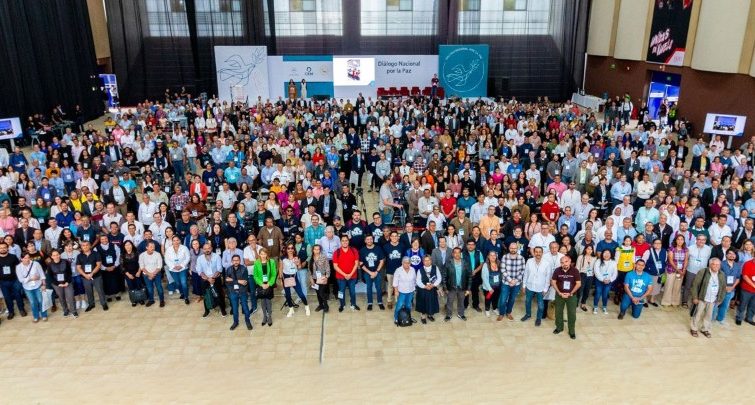
The message is loud and clear: in Mexico “it is time to act”, and to create a “national Network for peace”. This is the solemn commitment made by the promoters and participants of the national dialogue for peace, which closed after a three-day session on Saturday 23 September at the Latin American University of Puebla, with 1300 delegates in attendance.
The final document reads: “With deep love for Mexico, the Bishops of the Mexican Episcopal Conference and all those invited to this meeting are convinced that it is possible to build peace, to overcome the dynamics of violence and the destruction of the social fabric, knowing that there are no easy solutions.
Peace is a joint effort at many levels, involving all sectors of society.
It requires the sum of wills, the coordination of efforts, and the generosity of all to overcome the fear that seizes us in the face of the inertia and ineffectiveness of the authorities, which have not taken care of the primary task of building peace.”
The commitments of the Peace Agenda.
The Dialogue initiative was taken by the Mexican Church through various entities: the Bishops’ Conference, the Conference of Religious Men and Women, the Society of Jesus, and the pastoral care of the laity.
The goal was to honor the five million victims and the more than 500,000 dead or desaparecidos produced by the violence of Mexican criminal groups, and to elaborate a real “Peace Agenda,” which is in fact contained in the final appeal. Twenty-four reflections, proposals and concrete commitments taken by the promoters and proposed to Mexican societies and institutions. Noting that the current situation of violence in the country “has become intolerable,” the promoters set themselves specific goals: “to move from a culture of violence to a culture of care and peace; to respect the dignity of all people without distinction; to privilege the ethics of dialogue, collaboration and the ‘culture of encounter’; to be ‘artisans of peace’; to make young people protagonists of the future; and to seek to influence public policies and legislative processes.”
Some specific commitments follow: “Build the National Peace Network; participate in inclusive leadership and engagement; promote inter-institutional articulation, creating mechanisms for dialogue and collaboration; promote the implementation of the National Peace Agenda in the different sectors of society; present the National Peace Agenda to all candidates for elected office, whether municipal, state or federal; and build digital spaces that allow us to meet, connect, share experiences and join forces.”
Finally, the calls “to join the Network; to prioritize dialogue; to eradicate indifference and violence; to adopt the principles of the culture of caring, respect for the dignity of every human being, and the ethics of dialogue and collaboration; to take ownership of the National Agenda for Peace and to promote actions that enable its implementation in families, schools, communities, institutions, businesses, universities and other settings; to seek links that foster sustained peace-building efforts; and to demand that governments play their role effectively and transparently.”
The whole of society is called to participate. Among the main promoters of this initiative, which has been in preparation for months, are the Mexican Jesuits. More than a year ago, in June 2022, two of their confreres, Father Javier Campos and Father Joaquín Mora, along with two lay people, were slaughtered in a church in Cerocahui, in the middle of the Sierra Tarahumara in the northern state of Chihuahua. The incident sparked a strong reaction and mobilization effort within the Society of Jesus, as confirmed to SIR by Father Jorge Atilano González, coordinator of Jesuit social programs, who played an important liaison role in the Puebla event:
“This painful event aroused great indignation, our confreres were murdered at the altar. From this came the proposal for a renewed commitment”.
The Jesuits, the Episcopal Conference and the Conference of Religious began to prepare for the meeting in Puebla and to “prepare the ground” with a series of symbolic and prayerful initiatives in parishes and associations. This led to the National Dialogue. “They were very fruitful days,” continued Father Atilano. “Experts, university professors, businessmen and many social actors were present. The first day focused on the many cases of violence perpetrated by criminal groups operating in the country; on the second day, we focused on some of the good practices that already exist and also gave voice to police officers, witnesses and people who have been able to initiate courageous processes of peace and dialogue. Finally, the third day was dedicated to the drafting of the agenda. Forty bishops were present, the participation was very strong.”
It is certainly something new that a unanimous movement is making its way in Mexico, with the Church taking the lead.
“The next step now,” the Jesuit continued, “is to realize that peace requires an integral vision, that it must begin with the family, with schools, that all sectors of society are called to do their part: politics, certainly, but also the Church, businessmen, the police, judges, men of culture. A broad agenda is needed.”
Of course, there is no lack of awareness that the road will be long and difficult, and that violence in the country is entrenched and powerful, with strong ramifications in places of power: “Violence comes from all sides, especially in some parts of the country. Therefore, it will be important to take the Agenda to the state and local levels, to talk to the candidates in the upcoming 2024 elections, to accompany the implementation of the Agenda and the network we are building at the local level, and to set up technical tables.”
*journalist for “La vita del popolo”











